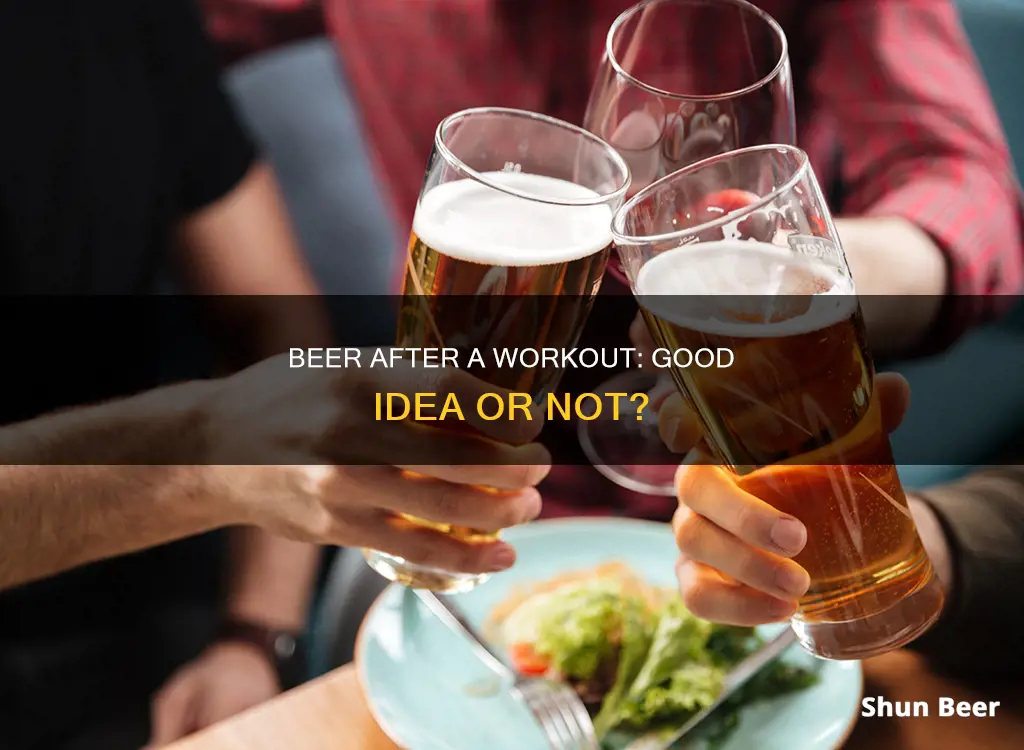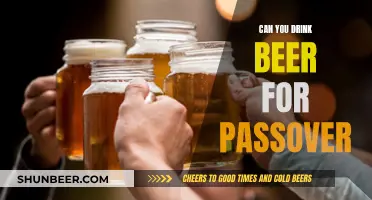
There are many theories about the order in which alcoholic drinks should be consumed to avoid a hangover. One popular saying is beer before liquor, never been sicker; liquor before beer, you're in the clear. This suggests that drinking beer before liquor will make you more unwell, and vice versa. However, this is a myth. Research has shown that the order in which you consume alcohol does not affect the severity of a hangover. The most important factor in preventing a hangover is the total amount of alcohol consumed.
| Characteristics | Values |
|---|---|
| Whether drinking order influences hangover severity | No, it is a myth. The amount of alcohol consumed matters more. |
| Whether drinking beer after liquor can make you sicker | No, it is a myth. Drinking too much alcohol, in general, can make you sick. |
| Whether drinking order has an impact on intoxication | No, it is a myth. How drunk a person feels depends on the total alcohol intake. |
What You'll Learn
- Hangover severity is linked to the amount of alcohol consumed, not the type
- Carbonated alcoholic drinks irritate the stomach lining, increasing alcohol absorption
- Drinking liquor first may lead to drinking less overall
- Drinking beer first may slow the spike in blood alcohol levels
- Other factors that influence hangovers include sleep, genetics, and diet

Hangover severity is linked to the amount of alcohol consumed, not the type
The old adage, "beer before liquor, never been sicker; liquor before beer, you're in the clear," suggests that drinking alcoholic beverages in a particular sequence will lessen the likelihood and intensity of a hangover. However, this is nothing more than a myth, as the order of consumption has little impact on the severity of a hangover.
The popular saying is based on the idea that liquor has a higher alcohol content and can rapidly increase blood alcohol levels compared to beer. Therefore, ending the night with beer after drinking liquor may slow the spikes in blood alcohol levels, potentially reducing the intensity of a hangover.
However, alcohol is absorbed quickly and efficiently regardless of the type of drink. A 2019 study examined the effects of drinking beer and wine in different orders and combinations on 90 adult participants. The results showed that drinking order and the type of alcohol did not influence hangover severity.
The key factor in determining hangover severity is the amount of alcohol consumed. High blood alcohol levels are more likely to lead to a hangover, regardless of whether it is beer, wine, or liquor. Other factors that can affect hangover symptoms include acetaldehyde, a toxic alcohol byproduct, disrupted sleep patterns, combining alcohol with other substances, and individual factors such as genetics and hydration levels.
To reduce the risk and severity of a hangover, it is essential to drink in moderation, stay hydrated, get sufficient sleep, and follow responsible drinking guidelines.
Mountain Men and Their Beer Drinking Habits
You may want to see also

Carbonated alcoholic drinks irritate the stomach lining, increasing alcohol absorption
The order in which you consume alcoholic beverages has little effect on the severity of a hangover. The total amount of alcohol consumed is a more significant factor. However, drinking carbonated alcoholic drinks can increase the speed of alcohol absorption, leading to a higher BAC.
Alcohol is absorbed into the bloodstream as soon as it reaches the stomach. From there, it quickly travels to the brain, kidneys, lungs, and liver. On average, the liver takes about an hour to break down one unit of alcohol. This process can be influenced by various factors, such as the drinker's body weight, metabolism, the amount of food consumed, the strength and type of alcohol, and any medications the person may be taking.
Carbonated alcoholic drinks can irritate the stomach lining, increasing alcohol absorption and potentially leading to a higher BAC. This is because the carbonation in these drinks speeds up the absorption process, and the irritation of the stomach lining can further impact how the body processes alcohol.
To reduce the risk of negative effects, it is important to drink in moderation and be mindful of the amount of alcohol consumed, regardless of whether it is beer, liquor, or a carbonated alcoholic beverage.
Beer Consumption in the US: A Yearly Overview
You may want to see also

Drinking liquor first may lead to drinking less overall
Drinking liquor before beer may lead to drinking less overall, and this idea is based on a few factors. Firstly, it is important to note that the order of consumption does not influence a person's hangover; rather, it is the amount of alcohol consumed that matters more. With any alcohol, inhibition decreases, leading to drinking more. So, if you start with liquor, which has a higher alcohol content, your inhibition goes down more quickly, and you tend to drink more.
Another factor is that people often progress from beer to liquor when drinking, and if they get sick at the end of the night, they blame the last drink. However, this may be because they have consumed more overall by the end of the night, not because of the order of drinks.
Additionally, carbonated drinks like beer can irritate the stomach lining, increasing alcohol absorption. So, if you start with beer, you may absorb alcohol more quickly, leading to greater inebriation.
Therefore, starting with liquor and transitioning to beer may be a better strategy to pace yourself and drink less overall. Lower-calorie beers are also a good option to monitor the amount of alcohol and sugar entering your system.
However, it is important to remember that the best way to avoid a hangover is to drink in moderation, stay hydrated, and get enough sleep.
Heart Patients and Beer: Is It Safe?
You may want to see also

Drinking beer first may slow the spike in blood alcohol levels
There is a common saying that goes, "Beer before liquor, never been sicker; liquor before beer, you're in the clear." This saying suggests that drinking beer before liquor will make you feel more unwell, while drinking liquor before beer will leave you feeling relatively better. However, this is just a myth, and there is no scientific evidence to support it.
That being said, there is some logic behind the saying. Liquor has a higher alcohol content than beer, so starting your night with liquor will cause your blood alcohol levels to spike more quickly. This can lead to drinking more overall, as your inhibitions decrease, and you may drink more eagerly. Therefore, drinking beer first may help slow this spike in blood alcohol levels and could be a better option if you are looking to pace yourself and avoid overconsumption.
It is important to note that the total amount of alcohol consumed is a more critical factor in determining the severity of a hangover than the order in which drinks are consumed. Other factors that can influence hangover symptoms include acetaldehyde, a toxic alcohol byproduct, disrupted sleep patterns, and combining alcohol with other substances. Additionally, drinking on an empty stomach can cause alcohol to be absorbed more rapidly, leading to a quicker spike in blood alcohol levels.
While drinking beer first may help slow the spike in blood alcohol levels, it is not a guarantee. The best way to avoid a hangover is to drink in moderation, stay hydrated, and get enough sleep.
Beer and Breastfeeding: Is It Safe?
You may want to see also

Other factors that influence hangovers include sleep, genetics, and diet
Sleep, genetics, and diet are all factors that can influence hangovers.
Sleep
Oversleeping can cause a feeling similar to that of a hangover. Scientists refer to this phenomenon as "sleep drunkenness". When you sleep too much, you confuse the part of your brain that controls your body's daily cycle, which is known as your circadian pacemaker. This can induce a sense of fatigue, similar to that of a hangover.
Genetics
Research has shown that genetics can play a role in hangovers. A study on Australian twins found that genetic factors accounted for 45% and 40% of the variation in hangover frequency in men and women, respectively. Additionally, genetics can influence how your body metabolises alcohol, as well as the effects of alcohol on sleep, hydration, blood sugar levels, and blood vessel dilation—all of which can impact hangover severity.
Diet
While there is no magic food that can cure a hangover, certain foods and drinks may be able to help alleviate symptoms. Eating a nutritious diet that includes fruits, vegetables, and complex carbohydrates can help reduce hangover symptoms. For example, bananas are rich in potassium, which can help replenish electrolytes lost during drinking. Avocados contain compounds that protect against liver injury and can help raise low potassium levels. Spinach is rich in folate, a nutrient that diminishes due to heavy drinking. Drinking coffee may also help improve alertness and reduce fatigue associated with hangovers.
Mixed Drinks: More Alcohol Than Beer?
You may want to see also
Frequently asked questions
No. It is a myth that the order in which you consume your drinks influences whether you experience a hangover the next day. The amount of alcohol you drink has a more significant effect than the type of alcohol you consume.
Alcohol begins to be absorbed into your bloodstream as soon as it reaches your stomach. Thus, all the alcohol you drank will have been absorbed well before your hangover takes effect.
The only way to completely prevent a hangover is to not drink alcohol or to drink in moderation. Some other tips include staying hydrated, getting plenty of sleep, and avoiding rounds.







